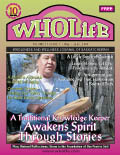Archives
Volume 11 Issue 1— May/June
2005

A Traditional Knowledge Keeper
Awakens Spirit Through Stories
by Naomi Lepage
I first met Wes Fine Day, a Cree Elder and Storyteller from
Sweetgrass, Saskatchewan, four years ago at a "Gathering" southeast
of Regina. I remember thinking it would be fun and interesting
to hear stories told about First Nation’s culture and
history. Little did I know how profoundly that day would
influence my life. I remember the first moment I heard Wes
speak; everything within me stopped to listen. Through the
use of stories, this Traditional Knowledge Keeper awakened
my spirit on a level that is ancient and beyond the bounds
of time. My intellect and logic could not understand how
these stories resonated and connected with a part of my spirit,
both emotionally and physically. Since then I have been fortunate
enough to work with Wes learning the protocols for earning
knowledge about medicines, sacred stories, and ceremony.
I thank Creator for bringing Wes into my spiritual family
and I am grateful for the opportunity to pass on some of
his teachings.
Read
the article
A Lovely Bunch of Coconuts
by Paulette Millis
The word coconut comes from the Spanish and Portugese word "coco",
which means monkey face. These explorers found a resemblance
to a monkey's face in the three round "eyes" found
at the base of the coconut. Coconuts, botanically known as “cocos
nucifera,” are the fruit of the coconut palm. It is
actually classified as a drupe, and not a nut, and is the
largest seed known. These "nut bearing" palms are
native to Malaysia, Polynesia, and Southeast Asia, and are
now prolific in South America, India, the Pacific Islands,
Hawaii, and Florida. Because the husk is light and fibrous,
it drifted on the oceans to other areas to propagate. The
husk was originally burned for fuel by the natives but now
a seed fibre, called "coir", is taken from the
husk to make brushes, mats, fishnets, and rope. The saturated
fat made from the coconut meat is used for cooking, as well
as for non-edibles such as soaps and cosmetics.
Read the article
Leaves of Three, Let it Be
Poison-ivy and its Antidote, Jewelweed
by Kahlee Keane
Poison-ivy is very abundant and everyone knows that it
is highly poisonous yet very few people can actually identify
it in the wild. When guiding a nature walk I am careful to
point it out yet there is always someone who will ask, “What’s
this plant?”, only to find out that they had a close
brush with poison-ivy! How do you avoid contact with this
plant? Your first and best defense is to become so familiar
with it that you can spot it any time, anywhere. Take time
to study it in all its guises in all seasons and you will
develop a sixth sense about its presence, even when it is
hidden from view.
Read the article
Anti-gymnastique Thérèse
Bertherat
A Method to Reveal Your True, Harmonious & Balanced Body
by Ginette Séguin-Swartz, BSc, PhD
Developed in the mid-1970s by French physiotherapist, Thérèse
Bertherat, anti-gymnastique, or anti-exercise, as it is translated
into English, has been taught for numerous years in France,
Italy, Spain, Germany, Switzerland, Brazil, and Argentina.
In Canada, anti-gymnastique instruction has until recently
only been available in Montreal. This powerful method is
based on the findings and teachings of French physiotherapist
Françoise Mézières. An expert in human
anatomy, Mézières developed an original approach
to physiotherapy and obtained spectacular results in curing
such severe structural deformations as scoliosis. Thérèse
Bertherat was a student of Mézières and practiced
for many years as a Mézières physiotherapist
before designing anti-gymnastique, which is a self-healing
method that involves the physical, emotional, and psychological
realms.
Read the article
Covenant Groups
Finding Our “Selves” Through the Small-Group Experience
by Barbara Adams
During the last one hundred years, life has changed dramatically.
The last few decades have produced individuals who are stressed
about time, money, and lack of social supports. As our culture
has changed, our lives have become a commodity whose productivity
is measured in time units and dollars. Where once the world
was about Sunday dinners, family parties, church, school,
and working together, we now live in a world of talk shows,
cable television, the internet, fast food, and computer games.
The media forms our new community, and our relationships
with celebrities begin to feel personal. We are living in
a consumption-oriented, electronic community that is moving
forward so quickly we barely have a chance to think about
what it is we really need and value.
Read the article
Editorial
by Melva Armstrong
Welcome to the Tenth Anniversary issue of WHOLifE Journal!
I find it hard to believe that ten years have passed since
I started this publication. These years have been filled
with many unique and diverse experiences, all of which have
made me a much stronger and more confident individual. Starting
one's own business is not like eating a piece of cake, as
many who have undertaken such a task will know, and I would
say it was mostly my naïveté that allowed me
to begin such a project and to continue with it, especially
in the early years. I mean naïveté in a very
positive sense, for it was my total innocence and trust in
my inner voice that gave me the confidence to begin the journal
and the desire to keep doing it from issue to issue.
Read the editorial.
Read
the editorial
Plus:
A Modern Approach to a Myth of Aging
Natural Reflections: Stone is the Foundation of Our Prairie Soil
News of Note
From Our Readers
|
